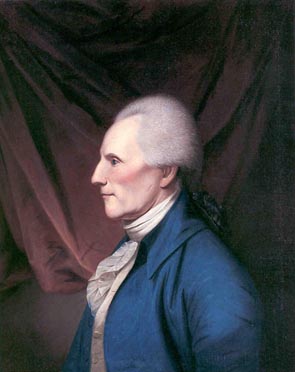 In the days leading up to the Fourth of July, Rick Moran at Right Wing Nuthouse has in past years liveblogged the Battle of Gettysburg. This year, he has been liveblogging the Second Continental Congress, beginning with July 2, 1776, the date on which the delegates approved Richard Henry Lee's resolution in favor of independence. My favorite part of that entry:
In the days leading up to the Fourth of July, Rick Moran at Right Wing Nuthouse has in past years liveblogged the Battle of Gettysburg. This year, he has been liveblogging the Second Continental Congress, beginning with July 2, 1776, the date on which the delegates approved Richard Henry Lee's resolution in favor of independence. My favorite part of that entry:John Adams is all smiles – a rarity, that. Independence wasn’t his idea but it had no greater champion nor ardent supporter than the gentleman from Massachussetts. I overheard him dictating a letter to his wife:
“The Second Day of July 1776 will be the most memorable Epocha, in the History of America. . . . It ought to be solemnized with Pomp and Parade, with Shows, Games, Sports, Guns, Bells, Bonfires, and Illuminations from one End of this Continent to the other from this Time forward forever more.”
I suspect that may be true. I can hear a bells in the background ringing joyously. It appears that word has spread quickly that the United Colonies are now the United States of America.
In his entry for July 3, Rick reported that the delegates, discussing the draft Declaration of Independence, fought over the issue of slavery:
Great excitement! Mr. Ruttledge and Mr. Adams had a knock down, drag out shouting match over the slavery section I quoted above. Ruttledge feels personally insulted by the passage and threatens the unity of the Congress unless it is stricken from the declaration. Adams believes that we can’t ignore the issue of slavery. To do so makes us hypocrites in the eyes of the world.
What to do? Both men have a point. By condemning the slave trade, do you not also condemn those who buy the slaves? And how is it possible to claim our own country on the basis of freedom while keeping millions in bondage?
My own feeling is that the issue isn’t worth tearing ourselves apart. The slavery issue will probably solve itself if we leave it alone and let the states that allow it to deal with it in their own time. After all, I wouldn’t want some Georgia planter telling me how to live my life. I’m not about to tell him what he can do with what is, after all, his own property.
But Adams is adamant about keeping the passage in the declaration and Ruttledge is steaming mad. Keeping one ear on the proceedings, I see where even some northerners are siding with Ruttledge so it seems inevitable that the passage will be struck from the final draft.
Someone pointed out once that the fact that Jefferson was delegated the task of drafting the Declaration revealed that the delegates did not consider the job all that important -- otherwise a number of others, including John Adams, would have fought to claim the prize for themselves. They had no idea that the Declaration, rather than the vote, would come to symbolize and be celebrated as the moment in which America became free.
I am not a big Jefferson fan. And it's also true (as Rick suggests) that the numerous changes that the delegates made to Jefferson's initial draft were improvements. But even I have to admit that it was Jefferson who had the vision to transform an assignment that no one else wanted into a clarion call for freedom that has inspired millions of people for 231 years.






No comments:
Post a Comment